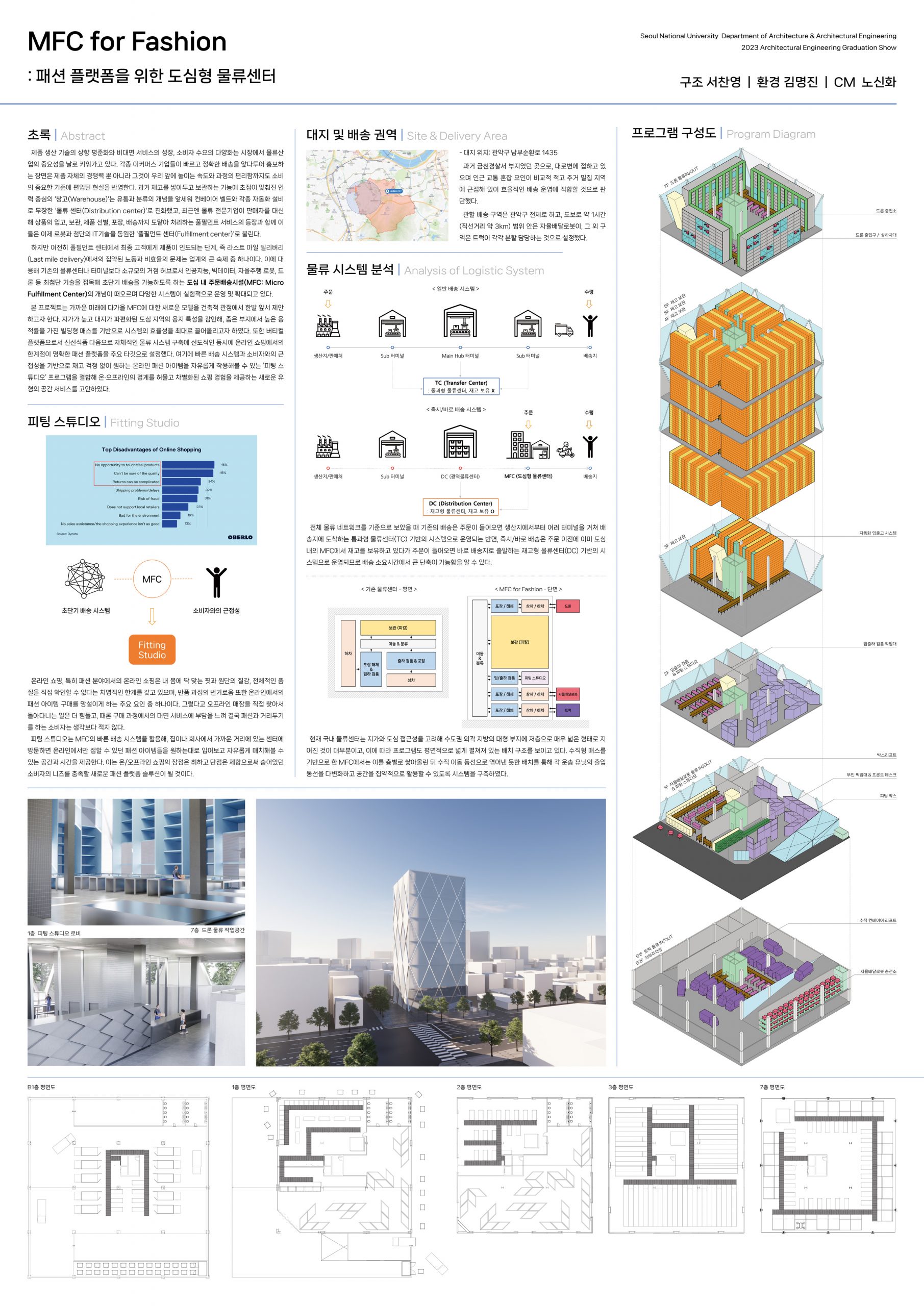서찬영(구조), 김명진(환경), 노신화(CM)
ChanYoung Seo(structure), MyongJin Kim(environment), Shinwha Noh (CM)
MFC for Fashion: 패션 플랫폼을 위한 도심형 물류센터
제품 생산 기술의 상향 평준화와 비대면 서비스의 성장, 소비자 수요의 다양화는 시장에서 물류산업의 중요성을 날로 키워가고 있다. 각종 이커머스 기업들이 빠르고 정확한 배송을 앞다투어 홍보하는 장면은 제품 자체의 경쟁력 뿐 아니라 그것이 우리 앞에 놓이는 속도와 과정의 편리함까지도 소비의 중요한 기준에 편입된 현실을 반영한다. 과거 재고를 쌓아두고 보관하는 기능에 초점이 맞춰진 인력 중심의 ‘창고(Warehouse)’는 유통과 분류의 개념을 앞세워 컨베이어 벨트와 각종 자동화 설비로 무장한 ‘물류 센터(Distribution center)’로 진화했고, 최근엔 물류 전문기업이 판매자를 대신해 상품의 입고, 보관, 제품 선별, 포장, 배송까지 도맡아 처리하는 풀필먼트 서비스의 등장과 함께 이들은 이제 로봇과 첨단의 IT기술을 동원한 ‘풀필먼트 센터(Fulfillment center)’로 불린다.
하지만 여전히 풀필먼트 센터에서 최종 고객에게 제품이 인도되는 단계, 즉 라스트 마일 딜리버리(Last mile delivery)에서의 집약된 노동과 비효율의 문제는 업계의 큰 숙제 중 하나이다. 이에 대응해 기존의 물류센터나 터미널보다 소규모의 거점 허브로서 인공지능, 빅데이터, 자율주행 로봇, 드론 등 최첨단 기술을 접목해 초단기 배송을 가능하도록 하는 도심 내 주문배송시설(MFC: Micro Fulfillment Center)의 개념이 떠오르며 다양한 시스템이 실험적으로 운영 및 확대되고 있다.
본 프로젝트는 가까운 미래에 다가올 MFC에 대한 새로운 모델을 건축적 관점에서 한발 앞서 제안하고자 한다. 지가가 높고 대지가 파편화된 도심 지역의 용지 특성을 감안해, 좁은 부지에서 높은 용적률을 가진 빌딩형 매스를 기반으로 시스템의 효율성을 최대로 끌어올리고자 하였다. 또한 버티컬 플랫폼으로서 신선식품 다음으로 자체적인 물류 시스템 구축에 선도적인 동시에 온라인 쇼핑에서의 한계점이 명확한 패션 플랫폼을 주요 타깃으로 설정했다. 여기에 빠른 배송 시스템과 소비자와의 근접성을 기반으로 재고 걱정 없이 원하는 온라인 패션 아이템을 자유롭게 착용해 볼 수 있는 ‘피팅 스튜디오’ 프로그램을 결합해 온·오프라인의 경계를 허물고 차별화된 쇼핑 경험을 제공하는 새로운 유형의 공간 서비스 고안하였다.
The upward standardization of product manufacturing technology, the growth of non-face-to-face services, and the diversification of consumer demand are increasingly emphasizing the importance of the logistics industry in the market. The scene of various e-commerce companies vying to promote fast and accurate delivery reflects the reality where not only the competitiveness of the product itself but also the speed and convenience of the process of it being delivered to us are now incorporated into important standards of consumption. In the past, labor-centric ‘warehouses’ that focused on storing and keeping inventory have evolved into ‘distribution centers’ armed with conveyor belts and various automated facilities that emphasize distribution and classification. Recently, with the advent of full fulfillment services, where logistics specialists take on everything from receiving and storing products to sorting, packaging, and shipping on behalf of the seller, they are now called ‘fulfillment centers’ that utilize robots and advanced IT technologies.
However, the intense labor and inefficiency in the step where the product is delivered to the final customer in the fulfillment center, i.e., last mile delivery, is still one of the major challenges in the industry. In response to this, the concept of Micro Fulfillment Center (MFC), a small-scale base hub than existing logistics centers or terminals, is emerging, applying cutting-edge technologies such as artificial intelligence, big data, autonomous robots, and drones to enable ultra-short-term delivery, and various systems are being experimentally operated and expanded.
This project aims to propose a step ahead from an architectural perspective for the new model of MFC that will be approaching in the near future. Considering the characteristics of urban areas with high price and fragmented land, it aimed to maximize the efficiency of the system based on a building mass with high floor area ratio on a narrow site. In addition, it set the fashion platform, which is clear in its limitations in online shopping and is pioneering in building its own logistics system next to fresh food, as its main target. Combining the 'fitting studio' program where you can freely try on any online fashion items you want without worrying about inventory, based on the quick delivery system and proximity to consumers, we devised a new type of space service that blurs the boundaries of online and offline and provides a differentiated shopping experience.

